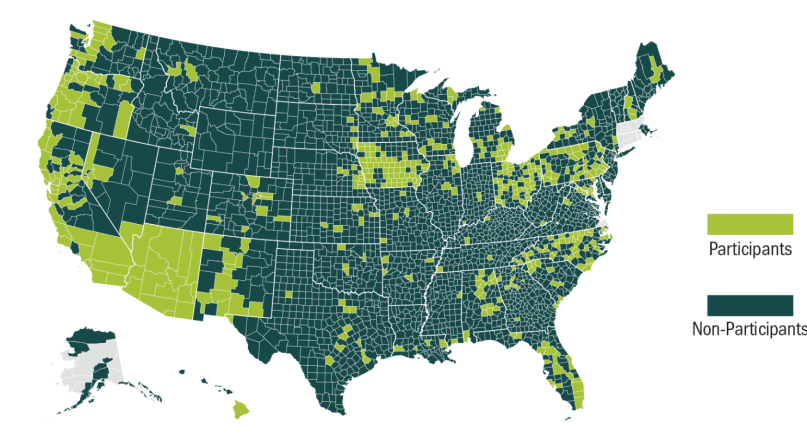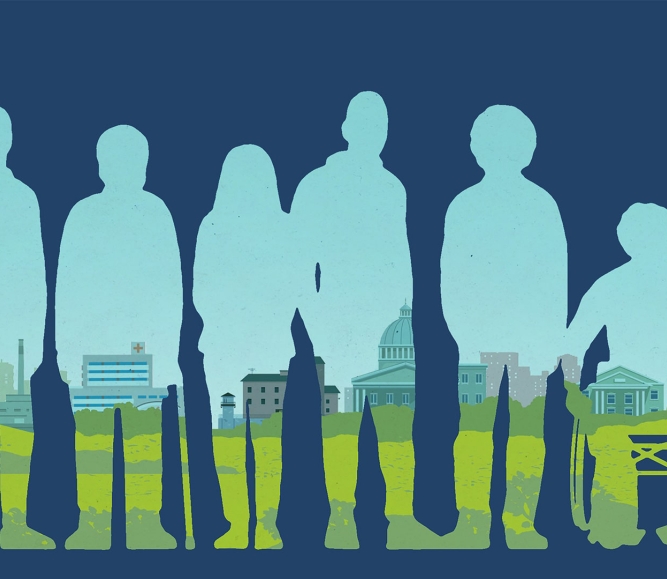Stepping Up initiative reaches 500 county participants

Key Takeaways
The national Stepping Up initiative to reduce mental illness in jails reached a milestone 500 county resolutions this month.
Started in May 2015 by NACo and its partners at The Council of State Governments Justice Center and the American Psychiatric Association Foundation, Stepping Up was launched as a way to elevate the issue of too many people with mental illnesses entering jail and provide county leaders with tools and resources to address this challenge locally.
As part of this launch, counties were called to action to pass a resolution or proclamation committing to joining the initiative and building data-driven and collaborative plans to tackle the issue in their communities.
The first county resolution was passed in April 2015 by Merrimack County, N.H., and the number of resolutions being submitted has continued to grow over the last four years of the initiative.
Learn More
The 500th county proclamation was passed by the Malheur County, Ore. Court on July 31.
“Malheur County decided to join the national Stepping Up initiative to support the work that we have already started to help people in our community achieve and maintain emotional well-being and get the services they need,” said Daniel Joyce, county judge.
“We already have a lot of support in our community to address this issue from our sheriff’s office, the courts and community partners and hope to make an even bigger difference in our residents’ lives with this initiative.”
Malheur County started its jail diversion program in July 2014.
The Jail Diversion team works closely with community partners, law enforcement agencies, courts, human services, community corrections, hospitals and the VA to collaborate on cases involving individuals with mental illnesses.
The program includes a dedicated forensic social worker from a community behavioral health provider, Lifeways.
The social worker provides services both in the community and in an office that is co-located inside the jail, where she conducts mental health assessments on people who enter the jail and offers case management and referrals as individuals are leaving to connect them to services.
The jail diversion team also trains law enforcement officers in Crisis Intervention Teams (CIT) and partners with parole and probation officers to help people under supervision access treatment and resources.
The program has reduced the amount of time that people with serious mental illnesses are staying in treatment and helped more people access the services they need in the community.
Joyce feels that joining Stepping Up can only help to enhance these efforts in his county.
Counties that are part of Stepping Up receive online technical assistance through webinars, toolkits, case studies, networking calls and in-person peer exchanges.
It’s not too late to join the initiative! Counties interested in receiving assistance to reduce the number of people with mental illnesses in their jails should visit stepuptogether.org to join the initiative.
Featured Initiative
The Stepping Up Initiative
The Stepping Up Initiative is a data-driven framework that aims to reduce the overincarceration of people with mental illnesses in jails through training, resources, and support that are tailored to local needs.

Related News

USDA and HHS release new dietary guidelines
On January 7, U.S. Department of Agriculture Secretary Brooke Rollins and U.S. Department of Health and Human Services Secretary Robert F. Kennedy, Jr. unveiled the new Dietary Guidelines for Americans, 2025–2030.

County Countdown – Dec. 15, 2025
Every other week, NACo's County Countdown reviews top federal policy advocacy items with an eye towards counties and the intergovernmental partnership.
